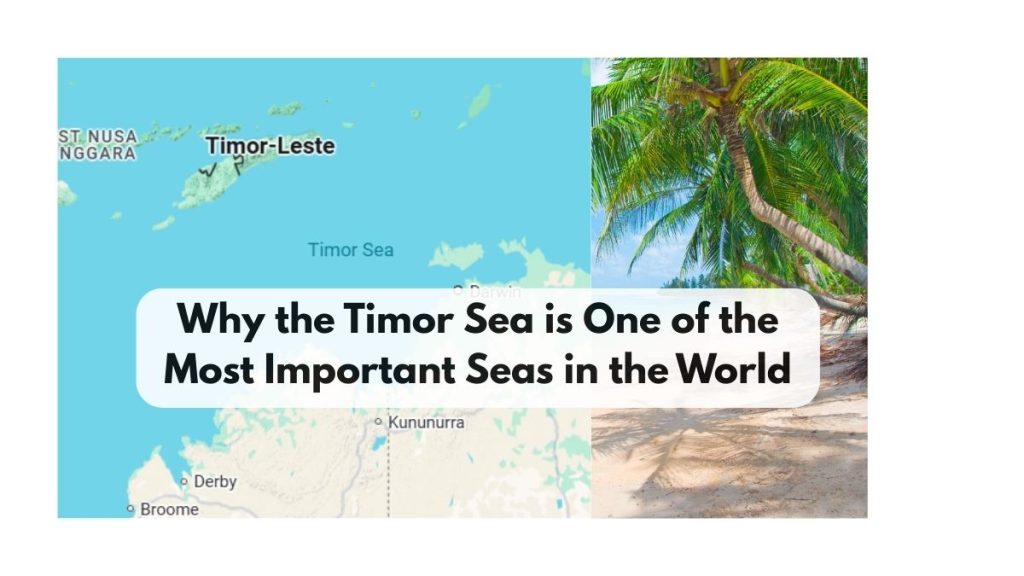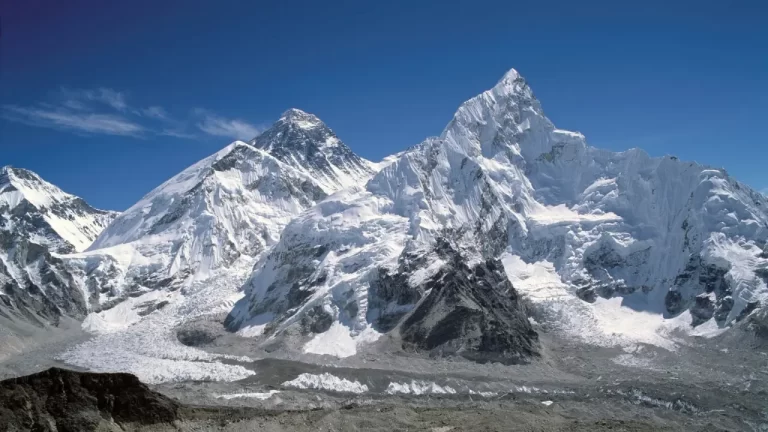The Timor Sea (click here to see map) is strategically water body located between Australia and Timor-Leste. Known for its rich marine biodiversity, oil and gas reserves, and historical importance, the Timor Sea plays a crucial role in the economic and environmental landscape of the region.

Geographical Features of the Timor Sea
The Timor Sea is a part of the Indian Ocean, situated between Timor Island to the north and Australia’s Northern Territory to the south. It spans approximately 610,000 square kilometers.
Key Geographic Facts:
| Feature | Details |
| Location | Between Timor-Leste and Australia |
| Area | 610,000 km² (235,000 mi²) |
| Depth | Shallow regions ~200 meters, deepest point Timor Trough at 3,300 meters |
| Connected To | Arafura Sea (east) and Indian Ocean (west) |
The sea contains several important gulfs and bays, including:
- Joseph Bonaparte Gulf
- Beagle Gulf
- Van Diemen Gulf
Climate and Weather Patterns
The climate of the Timor Sea is influenced by the southeast trade winds and the monsoon belt. This results in:
- Warm tropical temperatures
- High rainfall during monsoon season
- Frequent tropical cyclones, which impact coastal communities and industries
The region is an important area for weather monitoring, as tropical cyclones originating here can affect both Australia and Southeast Asia.
Ecological Importance of the Timor Sea
It is home to a diverse marine ecosystem, making it an important region for fisheries and marine conservation.
Key Marine Life:
| Marine Species | Importance |
| Coral Reefs | Habitat for marine life |
| Sea Turtles | Nesting grounds along islands |
| Dugongs | Rare and protected species |
| Various Fish Species | Supports commercial fishing |
| Endangered Dusky Sea Snake | Recently discovered, facing threats |
This biodiversity attracts marine biologists and conservationists, who work to preserve the fragile ecosystem.
Economic Resources
One of the biggest economic factors of the Timor Sea is its oil and gas reserves. Major oil fields in the area include:
- Bayu-Undan Gas Field
- Greater Sunrise Gas Field
- Laminaria and Corallina Fields
Contribution to Economy:
| Resource | Significance |
| Oil & Gas | Major revenue source for Timor-Leste and Australia |
| Fishing Industry | Supports local communities |
| Tourism | Potential for eco-tourism and diving spots |
The Greater Sunrise project, worth $74 billion, has been the center of economic discussions between Australia and Timor-Leste.
Historical Significance of the Timor Sea
World War II in the Timor Sea
During World War II, the Timor Sea witnessed significant naval battles and Japanese air raids on Australia. The sea played a strategic role in military operations, particularly around Darwin, Australia.
Today, remnants of wartime shipwrecks serve as a reminder of the sea’s historical importance.
Territorial Disputes and Treaties
Due to its rich natural resources, the Timor Sea has been a hotspot for territorial disputes.
Major Treaties:
| Treaty | Year | Purpose |
| Timor Gap Treaty | 1989 | Shared oil revenue between Australia & Indonesia |
| Timor Sea Treaty | 2002 | Revenue-sharing with newly independent Timor-Leste |
| Maritime Boundaries Treaty | 2018 | Final agreement on maritime boundaries |
The 2018 treaty officially established maritime borders and provided a fair revenue-sharing agreement for Timor-Leste’s oil and gas resources.
Environmental Concerns about the Sea
Despite its economic value, the Timor Sea faces several environmental challenges:
- Oil Spills: The 2009 Montara oil spill was Australia’s worst offshore spill, damaging marine life.
- Overfishing: Unregulated fishing activities threaten fish populations.
- Climate Change: Rising sea temperatures impact coral reefs and marine biodiversity.
Conservation efforts are needed to balance economic activities with environmental sustainability.
Recent Developments in Timor Sea
Greater Sunrise Gas Project
- Timor-Leste’s President José Ramos-Horta has expressed optimism about the Greater Sunrise project.
- Negotiations are ongoing regarding the location of gas processing.
- This project could transform Timor-Leste’s economy if agreements with Australia are finalized.
Endangered Dusky Sea Snake Discovery
- A rare dusky sea snake was recently found near Woodside Energy’s Browse gas project.
- Conservation groups are calling for environmental assessments before further gas extraction.
These developments highlight the economic and environmental balance that must be maintained in the Timor Sea.
5 Interesting Facts About the Timor Sea
- Timor Trough is one of the deepest parts of the Indian Ocean.
- The region is a nesting ground for endangered sea turtles.
- The sea has been a major oil exploration site for decades.
- Many World War II shipwrecks rest at the bottom of the Timor Sea.
- It is one of the world’s most cyclone-prone regions.
This Sea is a region of immense geographical, economic, and ecological importance. While it provides significant oil and gas revenue, it also faces challenges related to climate change, environmental conservation, and territorial disputes.
To sustain its value, there must be a balance between economic development and environmental protection. With ongoing discussions around the Greater Sunrise gas project, the Timor Sea continues to be a crucial area for international relations and marine conservation.




























